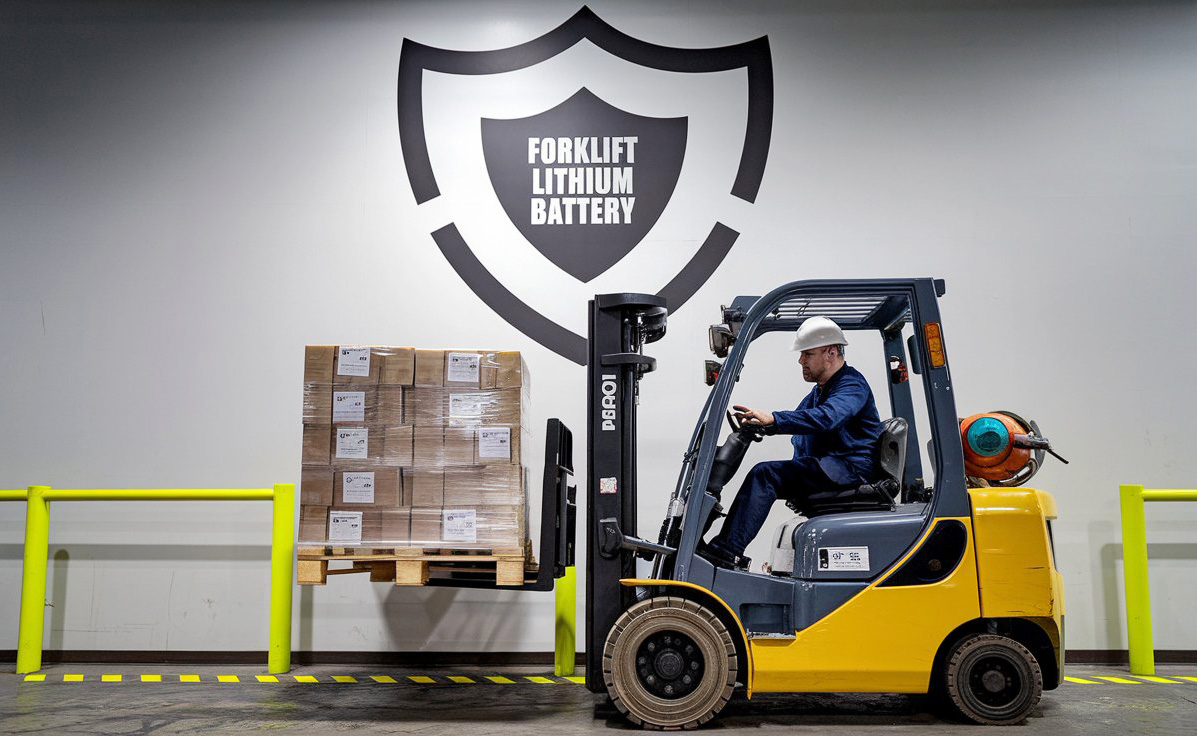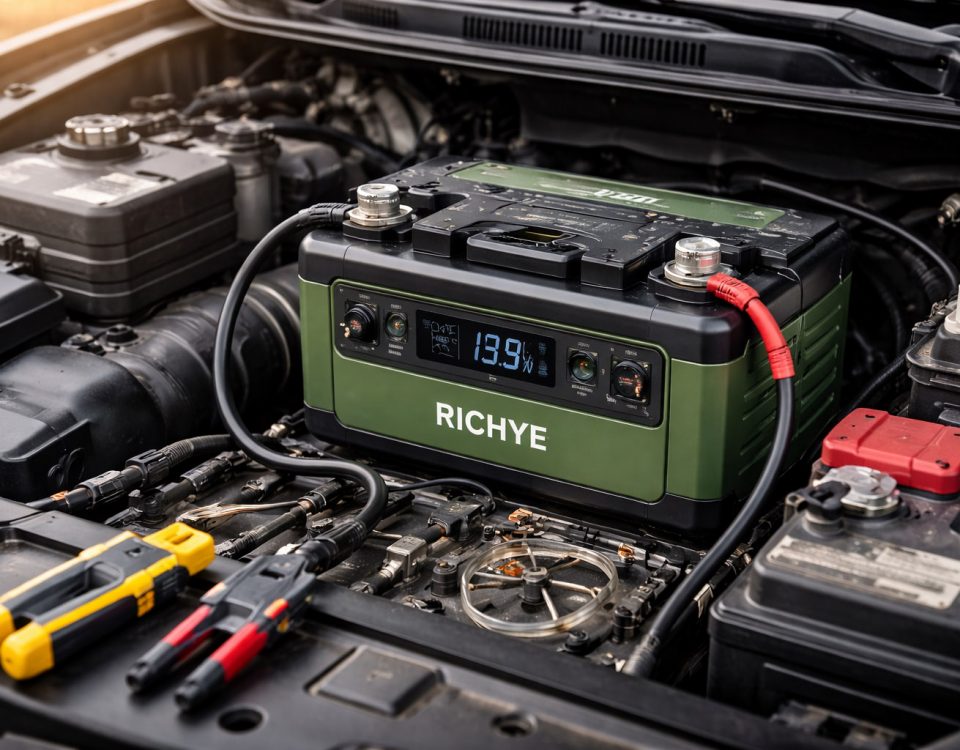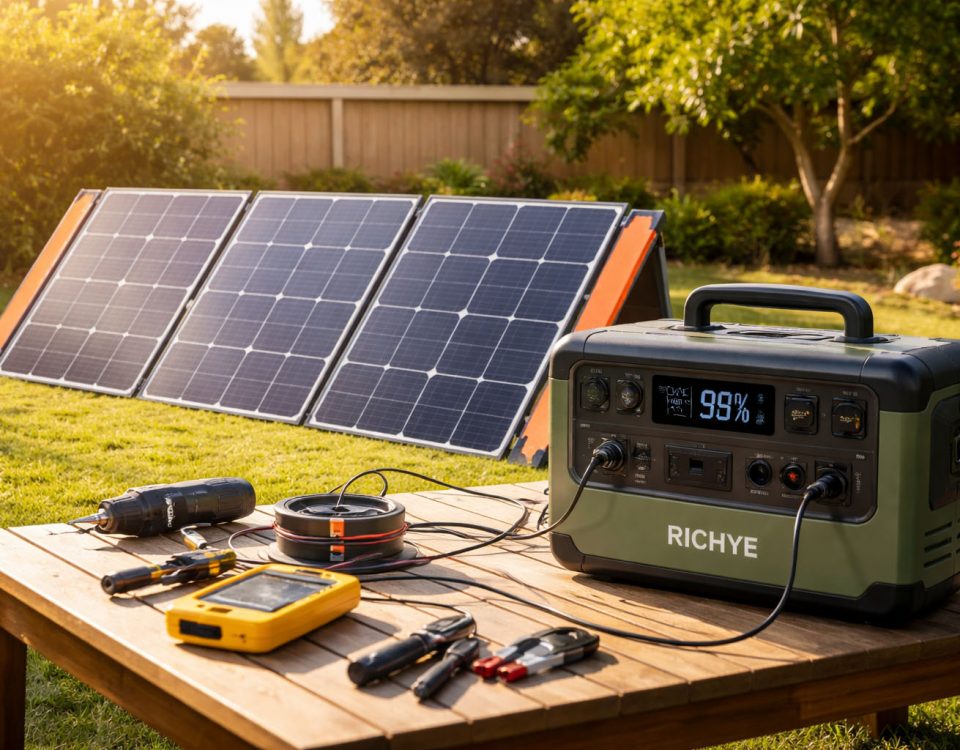Trong thế giới công nghiệp phát triển nhanh chóng ngày nay, nơi thiết bị nặng như xe nâng là yếu tố thiết yếu cho hoạt động sản xuất, an toàn luôn được đặt lên hàng đầu. Khi các doanh nghiệp chuyển đổi từ xe nâng sử dụng động cơ đốt trong (ICE) sang xe nâng điện, một trong những tiến bộ công nghệ quan trọng nhất là sự chuyển đổi sang pin lithium-ion. Trong số đó, pin lithium sắt photphat (LiFePO4) đang dẫn đầu trong việc mang lại không chỉ lợi ích môi trường và kinh tế, mà quan trọng hơn hết là nâng cao an toàn cho các ứng dụng công nghiệp.
Hiểu về pin lithium iron phosphate (LiFePO4): Lựa chọn an toàn hơn
Pin lithium sắt photphat (LiFePO4) Có những ưu điểm nổi bật so với các loại pin lithium-ion khác, đặc biệt là về mặt an toàn. Khác với pin lithium cobalt oxide (LCO) hoặc pin lithium nickel manganese cobalt oxide (NMC), pin LiFePO4 được biết đến với độ ổn định nhiệt xuất sắc, giúp chúng ít bị quá nhiệt hoặc hiện tượng chạy nhiệt, điều này có thể dẫn đến cháy nổ ở các loại pin khác.
Pin LiFePO4 sử dụng phosphate sắt làm vật liệu cực dương, vốn có cấu trúc hóa học ổn định hơn so với các biến thể lithium-ion khác. Sự ổn định này mang lại lợi thế an toàn đáng kể. Các pin này có dải nhiệt độ ổn định cao hơn, nghĩa là chúng có thể chịu được nhiệt độ cao mà không bị hư hỏng hoặc gây ra các phản ứng nguy hiểm. Hơn nữa, pin LiFePO4 có nguy cơ chập điện bên trong thấp hơn, ngay cả trong điều kiện cực đoan.
Hơn nữa, pin LiFePO4 có khả năng bảo vệ quá tải và xả quá mức vượt trội, giúp nâng cao đáng kể tính an toàn của chúng. Hệ thống quản lý nội bộ của pin có thể ngăn chặn hiệu quả các hư hỏng do quá tải hoặc xả quá mức gây ra, từ đó giảm thiểu các nguy cơ tiềm ẩn như phồng pin hoặc rò rỉ.
Yêu cầu an toàn trong ứng dụng xe nâng điện
Xe nâng điện được sử dụng rộng rãi trong các kho hàng, trung tâm phân phối và nhà máy sản xuất nơi yêu cầu xử lý vật liệu nặng. Những môi trường này thường có áp lực cao và rủi ro cao, với xe nâng thường được sử dụng trong thời gian dài, di chuyển các tải trọng nặng trong không gian hẹp.
Trong môi trường làm việc khắc nghiệt như vậy, độ tin cậy của ắc quy xe nâng trở nên vô cùng quan trọng. An toàn của người vận hành và nhân viên xung quanh phải là ưu tiên hàng đầu, đặc biệt khi xe nâng điện hoạt động gần các vật liệu dễ cháy hoặc môi trường nguy hiểm. Vì những lý do này, ắc quy xe nâng điện cần phải bền bỉ, chịu được áp lực và có khả năng chịu đựng các tác động vật lý và môi trường đi kèm với việc sử dụng công nghiệp thường xuyên.
Xe nâng hoạt động trong môi trường như vậy phải đối mặt với sự biến đổi nhiệt độ lớn, rung động mạnh và nguy cơ va chạm vật lý. Do đó, khả năng của pin duy trì ổn định trong điều kiện nhiệt độ cực cao, rung động mạnh và tải trọng va chạm là vô cùng quan trọng. Pin LiFePO4 đặc biệt phù hợp để đáp ứng những yêu cầu này. Khả năng hoạt động an toàn trong môi trường áp lực cao giúp pin LiFePO4 có ưu thế vượt trội so với pin chì-axit truyền thống hoặc thậm chí các loại pin lithium khác.
So sánh xe nâng điện với xe nâng động cơ đốt trong (ICE): Góc nhìn về an toàn
Khi so sánh xe nâng điện với xe nâng động cơ đốt trong (ICE) truyền thống, sự khác biệt về an toàn trở nên rõ ràng. Xe nâng ICE, mặc dù được sử dụng rộng rãi, tiềm ẩn nhiều rủi ro do sự hiện diện của nhiên liệu dễ cháy, khí thải và nhiệt độ cao sinh ra trong quá trình vận hành. Những rủi ro này có thể dẫn đến hỏa hoạn, khí độc và tai nạn, đặc biệt là trong các khu vực kín hoặc thông gió kém.
Mặt khác, xe nâng điện sử dụng pin LiFePO4 cung cấp một giải pháp sạch hơn và an toàn hơn. Việc không sử dụng nhiên liệu dễ cháy và không phát thải khí thải giúp giảm đáng kể nguy cơ cháy nổ và tiếp xúc với khí độc hại. Hơn nữa, tính ổn định nhiệt cao của pin LiFePO4 đảm bảo rằng chúng có thể hoạt động hiệu quả ngay cả trong môi trường nhiệt độ cao, điều này đặc biệt quan trọng trong các môi trường công nghiệp nơi xe nâng thường phải chịu tác động của nhiệt độ cao từ máy móc hoặc điều kiện thời tiết bên ngoài.
Khả năng chống sốc của pin LiFePO4 là một lợi ích an toàn quan trọng khác. Loại pin này ít bị hư hỏng do va chạm vật lý, khiến chúng trở thành lựa chọn an toàn hơn cho các hoạt động của xe nâng cần di chuyển liên tục, nâng hạ thường xuyên và có thể bị xử lý thô bạo. Ngược lại, xe nâng chạy động cơ đốt trong (ICE) có thể dễ bị hỏng hóc cơ học hơn do áp lực và mài mòn của động cơ.
Nghiên cứu trường hợp: Ưu điểm về an toàn của pin LiFePO4 trong hoạt động của xe nâng
Hãy cùng xem xét một ví dụ thực tế để làm rõ cách thức hoạt động. Pin LiFePO4 Vượt trội hơn các lựa chọn khác về mặt an toàn. Trong một hoạt động kho bãi quy mô lớn, xe nâng điện sử dụng pin LiFePO4 đã được đưa vào sử dụng để thay thế các mô hình cũ sử dụng pin chì-axit. Một trong những tính năng an toàn quan trọng được ghi nhận là khả năng chống lại hiện tượng quá nhiệt của pin LiFePO4.
Trong một sự cố, một xe nâng đã vô tình tiếp xúc với nhiệt độ cực cao khi được để gần một máy móc nóng trong thời gian dài. Trong khi các ắc-quy chì-axit cũ có thể đã bị quá nhiệt, rò rỉ hoặc thậm chí bốc cháy, ắc-quy LiFePO4 vẫn hoạt động bình thường mà không gặp bất kỳ vấn đề nào. Điều này là kết quả trực tiếp của tính ổn định nhiệt được cải thiện của ắc-quy, đảm bảo rằng nó vẫn an toàn và hoạt động bình thường ngay cả trong điều kiện khắc nghiệt.
Ngoài ra, các pin này được trang bị hệ thống quản lý pin tích hợp (BMS) mạnh mẽ, cung cấp khả năng bảo vệ chống sạc quá mức và xả quá mức. Ví dụ, khi một xe nâng bị để sạc qua đêm một cách vô tình, hệ thống BMS trong pin LiFePO4 sẽ tự động ngừng quá trình sạc khi pin đạt dung lượng tối đa. Đây là một tính năng an toàn quan trọng giúp ngăn chặn tình trạng sạc quá mức, có thể dẫn đến quá nhiệt hoặc các tình huống nguy hiểm khác trong các loại pin truyền thống.
Một ưu điểm khác là khả năng chống cháy. Trong quá trình thử nghiệm, pin LiFePO4 đã cho thấy xu hướng bắt lửa thấp hơn đáng kể so với các loại pin khác. Trong một thí nghiệm có kiểm soát, khi được tiếp xúc với nhiệt độ cao và xả điện cưỡng bức, pin LiFePO4 không cho thấy dấu hiệu của hiện tượng quá nhiệt hoặc bắt lửa, trong khi pin lithium-ion truyền thống có thể đã bắt lửa trong điều kiện tương tự.
Các ví dụ này cho thấy pin LiFePO4 không chỉ là giải pháp thân thiện với môi trường và hiệu quả hơn mà còn là lựa chọn an toàn hơn nhiều trong các môi trường công nghiệp có rủi ro cao.
RICHYE: Nhà sản xuất pin lithium đáng tin cậy
RICHYE là nhà sản xuất pin lithium chuyên nghiệp, chuyên cung cấp các loại pin hiệu suất cao cho nhiều ứng dụng khác nhau, bao gồm xe nâng điện, xe tự hành (AGVs) và hệ thống lưu trữ năng lượng. Các sản phẩm pin lithium của chúng tôi, bao gồm dòng LiFePO4, được thiết kế với tiêu chí an toàn, hiệu quả và độ bền cao.
Tại RICHYEChúng tôi hiểu rõ tầm quan trọng của an toàn trong môi trường công nghiệp. Các pin LiFePO4 của chúng tôi được trang bị Hệ thống Quản lý Pin (BMS) tiên tiến để theo dõi hiệu suất, ngăn chặn sạc quá mức và đảm bảo hoạt động an toàn trong điều kiện khắc nghiệt. Dù là cho xe nâng, xe golf hay giải pháp lưu trữ năng lượng, pin của RICHYE được thiết kế để mang lại sự an tâm và độ tin cậy.
Cam kết của chúng tôi về chất lượng và an toàn được thể hiện trong từng viên pin mà chúng tôi sản xuất, đảm bảo rằng khách hàng của chúng tôi nhận được các giải pháp năng lượng đáng tin cậy và hiệu quả về chi phí nhất có sẵn trên thị trường.
Kết luận: Tương lai của an toàn xe nâng là điện khí hóa.
Tóm lại, khi các ngành công nghiệp tiếp tục ưu tiên an toàn và hiệu quả, pin lithium iron phosphate (LiFePO4) đang chứng minh là một bước đột phá trong thị trường xe nâng điện. Khả năng ổn định nhiệt vượt trội, bảo vệ quá tải và khả năng chống sốc của pin LiFePO4 mang lại mức độ an toàn mà pin chì-axit truyền thống hoặc các tùy chọn pin lithium-ion khác không thể sánh kịp.
Khi ngày càng nhiều doanh nghiệp chuyển sang sử dụng xe nâng điện chạy bằng pin LiFePO4, chúng ta có thể kỳ vọng vào sự giảm đáng kể các sự cố liên quan đến an toàn, tạo ra môi trường làm việc an toàn hơn cho người vận hành và giảm thiểu rủi ro ngừng hoạt động tốn kém. Với hiệu suất vượt trội và ưu điểm về an toàn, pin LiFePO4 đang thiết lập tiêu chuẩn cho các ứng dụng xe nâng trên toàn thế giới.
Bằng cách lựa chọn pin LiFePO4, các doanh nghiệp không chỉ nâng cao hiệu quả hoạt động và giảm chi phí mà còn đảm bảo mức độ an toàn cao nhất cho nhân viên và hoạt động của mình. Tương lai của an toàn xe nâng đã đến, và nó là điện.




